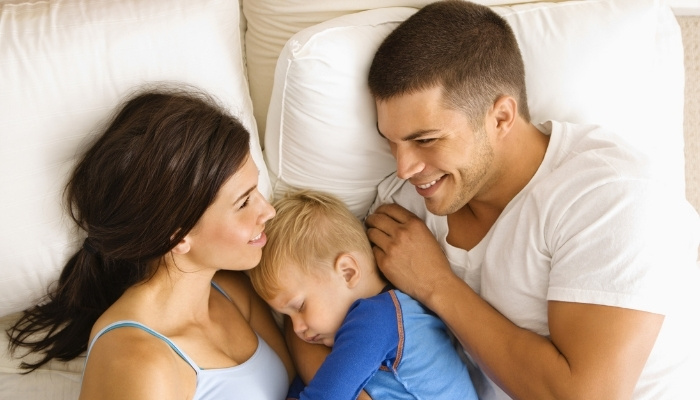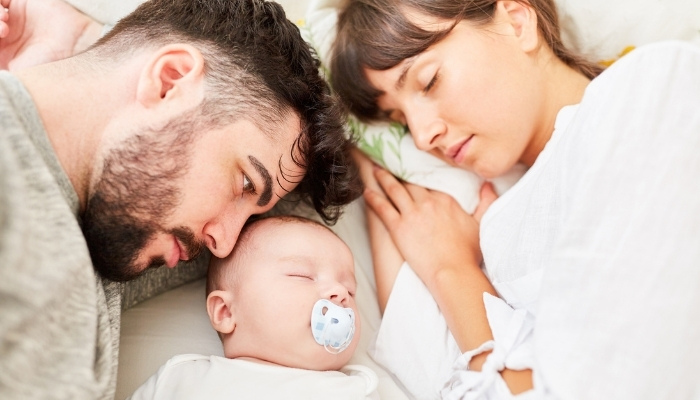Co-sleeping is a widely discussed issue among parents, with varying opinions. Regardless of your choice on the matter, it is important to be informed about the potential advantages and drawbacks before reaching a decision.
Does co-sleeping create bad habits? Co-sleeping can create bad habits, but there are benefits as well. It really depends on your child and a variety of other factors. Research has shown that for most children, co-sleeping is a hard habit to break, and continuing to co-sleep can lead to sleep issues for everyone involved.
There are potential benefits and drawbacks to keeping your child close at night. You have to weigh the consequences of your decision before knowing what is right for your family.
Effects of Co-Sleeping
Co-sleeping impacts your child, and it also impacts the parent sharing a bed with them.
Positive Effects of Co-Sleeping
Co-sleeping does offer benefits, and that’s why some parents find it to be the best option for their families.
For Infants
It’s imperative if you choose to co-sleep with infants that you follow safety guidelines. You want to create the safest environment possible because co-sleeping with an infant can increase the risk of SIDS or suffocation.
Co-sleeping makes breastfeeding easier to navigate, and breastfeeding offers a multitude of benefits. Co-sleeping can even help your baby regulate their body temperature, and they may go to sleep faster with an adult close.
While co-sleeping with an infant who wakes often can be disruptive, some parents reported feeling less stressed at night when their baby was in the room or bed with them.
For Toddlers
Co-sleeping with a toddler is safer than co-sleeping with an infant, and it can also be good for your child.
Toddlers who sleep with their parents experienced lower cortisol levels, which means they were less stressed. This benefits their mental and physical well-being.
Your child may also experience a feeling of security being close to a parent, and this can help you and your child weather those toddler tantrums with a stronger bond.
For School-Age Children
Your child is faced with tons of change when they start school. Continuing to co-sleep can offer consistency that helps them during this time.
Negative Effects of Co-Sleeping
Co-sleeping isn’t all rainbows and magic. There are plenty of negatives that keep many parents from wanting to try it.
For Infants
Co-sleeping can increase your child’s risk of SIDS or suffocation, especially if it’s not done safely.
Falling asleep with your child on a couch or in a recliner is extremely dangerous, and you should only co-sleep on a flat surface without pillows, blankets, or other items.
Even then, many parents are too anxious to rest when their infant is in the same bed as they are and may struggle to sleep.
For Toddlers
Co-sleeping may be calming for some kids, but it can increase anxiety levels in other kids. Research shows that kids who co-sleep have higher anxiety levels later in life, though the connection to co-sleeping has not been explicitly explored.
For School-Age Children
Your school-age child may not get enough quality sleep if they share your bed every night. Studies show they are more likely to be tired during the school day, and they may have trouble going to sleep on their own.
What Experts Advise
Your child should share your room for the first six months to a year of his life, but experts advise he should have his own bed.
This can mean putting a bassinet or crib in your room so your baby is close. However, they don’t recommend bed-sharing in the first year.
After that, the risk of SIDS decreases, but that doesn’t mean you have to co-sleep or bed-share. The American Association of Pediatrics discourages bed-sharing at any age.
When To Stop Co-Sleeping

If your child co-sleeps, you may wonder when it’s time to stop the practice. While every family is different, there are signs that the co-sleeping relationship may no longer be working for you or your child.
If your child is waking frequently and is exhausted during the day, it may be time to transfer to his own bed. There’s no set age that this has to happen, but many parents find their kids need quality sleep to function in school.
That means it’s a good idea to start transitioning your child to his own bed before that first day of school.
However, other cultures practice co-sleeping beyond the age of five. If everyone in your home is happy about the arrangement and getting adequate rest, then you don’t have to stop until you are ready.
Transitioning From Co-Sleeping to Crib
Transition your baby from co-sleeping to his crib using baby steps that are less intimidating. For example, keep the crib in your room so your child is still close and can sense your presence.
This should help him calm when he wakes up during the night, and it will make breastfeeding easier for you if your child is still night nursing.
Transitioning From Co-Sleeping for Older Children
It can be difficult for older children to sleep in their own beds if they are used to sleeping with you. Again, small steps make the transition easier.
Rest with your child for a bit of time each night, and lessen the time as the nights proceed. Let your child choose bedding and other items to make their room cozy and their bed appealing.
Related Questions:
When Is a Child Too Old To Sleep With Parents?
There is no set age when kids are too old to sleep with their parents. Kids who co-sleep for a long time will still likely choose their own bed by the time they are teens. However, it’s normal to want them out of the bed before that.
Your child having their own bed as they enter elementary school is probably a good idea. While they may still sneak in with you on occasion, it’s a good time to help them sleep independently and get adequate rest for the next day’s activities.
Why Does My Baby Sleep Better in My Bed?
Your baby probably sleeps better in your bed because they have access to their favorite person: you! It’s also easier for your child to breastfeed without having to completely wake up if they are near you, and that means more sleep for them.
Final Thoughts
Your child was in your womb for nine months, so it’s normal that your smell, voice, and presence will offer your child more comfort when it’s time to sleep.
Co-sleeping isn’t for everyone, but it has pros and cons just like most other parenting choices. You have to figure out what works best so your entire family can rest well.
Kristy is the mother of four, including identical twins. With a background in education and research, she is constantly learning more about parenting and raising multiples. When she has spare time, she enjoys hiking into the woods with a great book to take a break.

